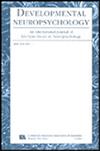Top-down Inhibitory Motor Control Is Preserved in Adults with Developmental Coordination Disorder.
IF 2.2
4区 心理学
Q3 PSYCHOLOGY
Developmental Neuropsychology
Pub Date : 2021-09-01
Epub Date: 2021-09-05
DOI:10.1080/87565641.2021.1966431
引用次数: 0
Abstract
Two paradigms were employed to disentangle information processing from executive motor inhibition in adults with Developmental Coordination Disorder (DCD). Choice Reaction and Stop Signal Tasks were compared between 13 adults fulfilling DSM-5 DCD criteria and 42 typically developing adults. Additional analyses included 16 probable DCD (pDCD) participants, who had motor difficulties but did not fulfil DSM-5 criteria. Analyses employed frequentist and Bayesian modeling. While DCD+pDCD showed slower reaction times and difficulty initiating Go responses, no impairments in Stop actions were found. These findings indicated no executive deficit in DCD, suggesting that previous results may be explained by inefficient information processing.
自上而下的抑制性运动控制在成人发育协调障碍中保留。
采用两种范式对成人发展性协调障碍(DCD)的信息加工与执行运动抑制进行分离。选择反应和停止信号任务在13名符合DSM-5 DCD标准的成年人和42名正常发育的成年人之间进行比较。额外的分析包括16名可能的DCD (pDCD)参与者,他们有运动困难,但不符合DSM-5标准。分析采用了频率模型和贝叶斯模型。而DCD+pDCD表现出较慢的反应时间和难以启动围棋反应,没有发现停止动作的损伤。这些发现表明在DCD中没有执行缺陷,表明以前的结果可以用低效的信息处理来解释。
本文章由计算机程序翻译,如有差异,请以英文原文为准。
求助全文
约1分钟内获得全文
求助全文
来源期刊
CiteScore
2.80
自引率
6.70%
发文量
17
审稿时长
>12 weeks
期刊介绍:
Devoted to exploring relationships between brain and behavior across the life span, Developmental Neuropsychology publishes scholarly papers on the appearance and development of behavioral functions, such as language, perception, and social, motivational and cognitive processes as they relate to brain functions and structures. Appropriate subjects include studies of changes in cognitive function—brain structure relationships across a time period, early cognitive behaviors in normal and brain-damaged children, plasticity and recovery of function after early brain damage, the development of complex cognitive and motor skills, and specific and nonspecific disturbances, such as learning disabilities, mental retardation, schizophrenia, stuttering, and developmental aphasia. In the gerontologic areas, relevant subjects include neuropsychological analyses of normal age-related changes in brain and behavioral functions, such as sensory, motor, cognitive, and adaptive abilities; studies of age-related diseases of the nervous system; and recovery of function in later life.
Empirical studies, research reviews, case reports, critical commentaries, and book reviews are featured in each issue. By publishing both basic and clinical studies of the developing and aging brain, the journal encourages additional scholarly work that advances understanding of the field of lifespan developmental neuropsychology.

 求助内容:
求助内容: 应助结果提醒方式:
应助结果提醒方式:


